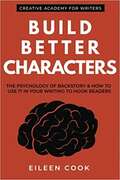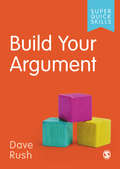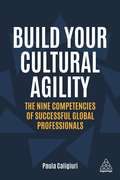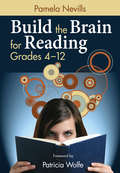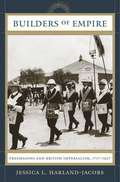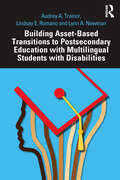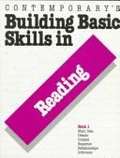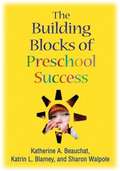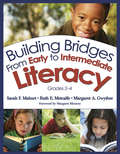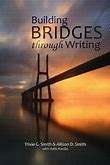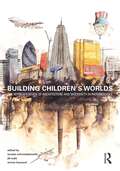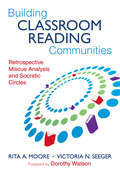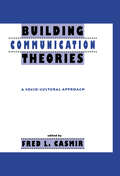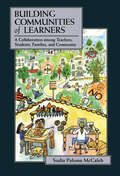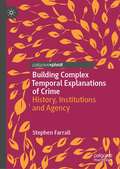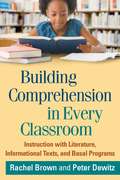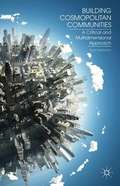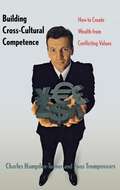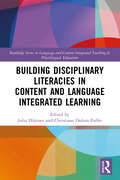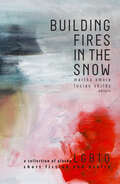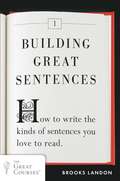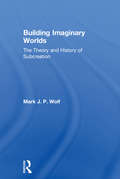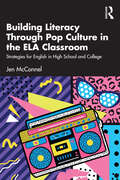- Table View
- List View
Build Better Characters
by Eileen CookCompelling characters are what keeps readers turning pages and buying books — from fantasies to mysteries to the great literary novel. But how to do you create characters that feel three dimensional and real on the page? <p><p> Counsellor and author Eileen Cook shares common psychological techniques to help you build your characters and take your story to the next level. <p><p> Covering understanding your character's backstory and how it impacts their choices in your book by doing a structured counselling interview, personality structure (Myers Briggs and Emotional Intelligence) and how that may lead to conflict, and understand dissecting the Stages of Change to see how your character moves through them . <p><p> Filled with practical tips, examples and prompts this is a craft book you will return to over and over. <p><p> This is the second book in the Creative Academy Guides for Writers series. Be sure to check out the rest of the guides for writers in this series.
Build Your Argument (Super Quick Skills)
by Dave RushTrying to make sense of making an argument? This straightforward book breaks down how to build a convincing argument for any type of assessment. Find out what an academic argument is – and what it is not Develop a toolkit for structuring an argument effectively Learn how to use evidence and counterarguments to back up your position. Super Quick Skills provides the essential building blocks you need to succeed at university - fast. Packed with practical, positive advice on core academic and life skills, you’ll discover focused tips and strategies to use straight away. Whether it’s writing great essays, understanding referencing or managing your wellbeing, find out how to build good habits and progress your skills throughout your studies. Learn core skills quickly Apply them right away and see results Succeed in your studies and in life Super Quick Skills gives you the foundations you need to confidently navigate the ups and downs of university life.
Build Your Argument (Super Quick Skills)
by Dave RushTrying to make sense of making an argument? This straightforward book breaks down how to build a convincing argument for any type of assessment. Find out what an academic argument is – and what it is not Develop a toolkit for structuring an argument effectively Learn how to use evidence and counterarguments to back up your position. Super Quick Skills provides the essential building blocks you need to succeed at university - fast. Packed with practical, positive advice on core academic and life skills, you’ll discover focused tips and strategies to use straight away. Whether it’s writing great essays, understanding referencing or managing your wellbeing, find out how to build good habits and progress your skills throughout your studies. Learn core skills quickly Apply them right away and see results Succeed in your studies and in life Super Quick Skills gives you the foundations you need to confidently navigate the ups and downs of university life.
Build Your Cultural Agility: The Nine Competencies of Successful Global Professionals
by Paula CaligiuriThe investment in global collaboration technology now exceeds US$45 billion. Professionals who work across cultures face some of the most cognitively, psychologically and emotionally difficult challenges, regardless of whether they work virtually or in person. And they often face these challenges without the help of a corporate guide. Build Your Cultural Agility is that guide. This book offers strategies to help you develop into a successful global professional, one who can comfortably and effectively work in and with people from different cultures. This book helps you leverage your natural strengths while providing suggestions for developing cultural agility competencies. Build Your Cultural Agility focuses on nine specific competencies that comprise cultural agility: three self-management competencies (tolerance of ambiguity, curiosity and resilience), three relationship-management competencies (humility, relationship-building and perspective-taking) and three task-management competencies (cultural minimization, cultural adaptation and cultural integration). Within each chapter, the author provides a case example of that competency in action, explains why the competency is critical for success, offers a self-awareness exercise to help you determine your level of proficiency and concludes with suggestions for self-development.
Build the Brain for Reading, Grades 4–12
by Pamela A. NevillsEngage students' brains with state-of-the-art literacy strategies. This reference infuses the most current neurology research into concrete steps for targeted, developmentally appropriate reading instruction.
Builders of Empire
by Jessica L. Harland-JacobsThey built some of the first communal structures on the empire's frontiers. The empire's most powerful proconsuls sought entrance into their lodges. Their public rituals drew dense crowds from Montreal to Madras. The Ancient Free and Accepted Masons were quintessential builders of empire, argues Jessica Harland-Jacobs. In this first study of the relationship between Freemasonry and British imperialism, Harland-Jacobs takes readers on a journey across two centuries and five continents, demonstrating that from the moment it left Britain's shores, Freemasonry proved central to the building and cohesion of the British Empire.The organization formally emerged in 1717 as a fraternity identified with the ideals of Enlightenment cosmopolitanism, such as universal brotherhood, sociability, tolerance, and benevolence. As Freemasonry spread to Europe, the Americas, Asia, Australasia, and Africa, the group's claims of cosmopolitan brotherhood were put to the test. Harland-Jacobs examines the brotherhood's role in diverse colonial settings and the impact of the empire on the brotherhood; in the process, she addresses issues of globalization, supranational identities, imperial power, fraternalism, and masculinity. By tracking an important, identifiable institution across the wide chronological and geographical expanse of the British Empire, Builders of Empire makes a significant contribution to transnational history as well as the history of the Freemasons and imperial Britain.
Building Asset-Based Transitions to Postsecondary Education with Multilingual Students with Disabilities
by Audrey A. Trainor Lindsay E. Romano Lynn A. NewmanThis important volume presents the results from a five-year, mixed methods study on the transition from high school to postsecondary education for young adults who, during secondary school, received both English learner and special education services. It aims to improve our understanding of, and thus the supportive service provisions for, the dually identified student population in secondary and higher education settings. The book explores dually identified students’ complex and intersectional experiences, strengths, and needs using multiple methods of inquiry, including the examination of educational transition-focused policies and practices, a comprehensive review of research results, case studies, and comparative analysis of key stakeholder perspectives for this student population. With a focus on equitable, culturally sustaining transition research and practice, the book informs graduate students, researchers, and teacher educators about how to mitigate the effects of historical marginalization, increasing our collective understanding of intersectional experiences and how they shape young adults’ choices as they leave high school and move into young adulthood.
Building Basic Skills in Reading
by Rob SaxBuilding Basic Skills in Reading, Books 1 and 2 will give you, the learner, all you need to master the basics of reading well. Together, the books give a complete program that is easy to use on your own or with a teacher in class.
Building Blocks of Preschool Success
by Katrin Blamey Katherine BeauchatWritten expressly for preschool teachers, this engaging book explains the "whats," "whys," and "how-tos" of implementing best practices for instruction in the preschool classroom. The authors show how to target key areas of language and literacy development across the entire school day, including whole-group and small-group activities, center time, transitions, and outdoor play. Detailed examples in every chapter illustrate what effective instruction and assessment look like in three distinct settings a school-based pre-kindergarten, a Head Start center with many English language learners, and a private suburban preschool. Helpful book lists, charts, and planning tools are featured, including reproducible materials.
Building Bridges From Early to Intermediate Literacy, Grades 2-4
by Sarah F. Mahurt Ruth E. Metcalfe Margaret Ann GwytherHelp all learners transition successfully from beginning to intermediate literacy levels with these classroom-tested instructional strategies and specialized assessment tools for word study, reading, and writing.
Building Children’s Worlds: The Representation of Architecture and Modernity in Picturebooks
by Torsten Schmiedeknecht Jill Rudd Emma HaywardChildren are the future architects, clients and users of our buildings. The kinds of architectural worlds they are exposed to in picturebooks during their formative years may be assumed to influence how they regard such architecture as adults. Contemporary urban environments the world over represent the various stages of modernism in architecture. This book reads that history through picturebooks and considers the kinds of national identities and histories they construct. Twelve specialist essays from international scholars address questions such as: Is modern architecture used to construct specific narratives of childhood? Is it taken to support ‘negative’ narratives of alienation on the one hand and ‘positive’ narratives of happiness on the other? Do images of modern architecture support ideas of ‘community’? Reinforce ‘family values’? If so, what kinds of architecture, community and family? How is modern architecture placed vis-à-vis the promotion of diversity (ethnic, religious, gender etc.)? How might the use of architecture in comic strips or the presence of specific kinds of building in fiction aimed at younger adults be related to the groundwork laid in picturebooks for younger readers? This book reveals what stories are told about modern architecture and shows how those stories affect future attitudes towards and expectations of the built environment.
Building Classroom Reading Communities: Retrospective Miscue Analysis and Socratic Circles
by Rita A. Moore Victoria N. SeegerDeveloped for teaching learners of all abilities, this guide presents a powerful approach to literacy development for elementary students based on individual coaching, classwide discussions, and assessment.
Building Communication Theories: A Socio/cultural Approach (Routledge Communication Series)
by Fred L. CasmirConcern with various matters related to humans as they communicate has led to an increase in both research and theorizing during the second half of the 20th century. As a matter of fact, so many scholars and so many disciplines have become involved in this process that it is virtually impossible to understand and appreciate all that has been accomplished so far. This book focuses on one important aspect of human sense-making -- theory building -- and strives to clarify the thesis that theories do not develop in some sort of social, intellectual, or cultural vacuum. They are necessarily the products of specific times, insights, and mindsets. Theories dealing with the process of communication, or communicating, are tied to socio-cultural value systems and historic factors that influence individuals in ways often inadequately understood by those who use them. The process-orientation of this book inevitably leads to an emphasis on the perceptions of human beings. Thus, the focus shifts from the subject or area called "communication" to the act of communicating. Finally, this volume offers insight into how the process of human sense-making has evolved in those academic fields commonly identified as communication, rhetoric, speech communication or speech, within specific socio-cultural settings.
Building Communities of Learners: A Collaboration Among Teachers, Students, Families, and Community
by Sudia Paloma McCalebThis popular text shows how teachers can create partnerships with parents and students that facilitate participation in the schools while also validating home culture and family concerns and aspirations. It reflects current research and theory in several areas related to literacy development, including family literacy, bilingual and multicultural education, critical pedagogy, participatory research, cooperative learning, and feminist perspectives. Teachers of students who are immigrants, non-native speakers of English, and members of marginalized groups will find this book especially pertinent.
Building Complex Temporal Explanations of Crime: History, Institutions and Agency (Critical Criminological Perspectives)
by Stephen FarrallThis book seeks to bring understanding of both complexity and temporality into criminology. It outlines why these are important in criminological models of causation and explanation and explores them by drawing on theories and approaches in political science, comparative history, social theory and systems analyses. It discusses what is meant by complexity and introduces historical institutionalism (which is rarely used in criminology) to criminological audiences; it introduces what is known as ‘why-because’ analyses to the social sciences. This style of thinking is used to explore the causes of major transportation accidents (such as aeroplane or ferry disasters) and involves the integration of structural, organisational and agentic inputs in accounting for such disasters. Chapters on realistic evaluation, theories of structuration and agency, and research design and research methods are included with an example project based on the author's recent studies of Thatcherism which shows how these theories can be applied to empirical data. This book speaks to those interested in criminology, sociology, political science, research methods and the wider social sciences.
Building Comprehension in Every Classroom
by Nell K. Duke Peter Dewitz Rachel BrownThis book presents a practical model and specific unit- and lesson-planning ideas for enhancing students' reading comprehension in any 2-8 classroom. The authors provide innovative suggestions that help teachers construct a comprehension curriculum organized around literature, informational texts, or a basal reading program. Vivid case examples and vignettes bring to life ways to build the knowledge, strategies, and motivation that children need to engage with different types of texts and become proficient, enthusiastic readers. Graphic elements throughout the volume link instructional and assessment practices directly to the Common Core standards.
Building Cosmopolitan Communities
by Amos NascimentoBuilding Cosmopolitan Communities contributes to current cosmopolitanism debates by evaluating the justification and application of norms and human rights in different communitarian settings in order to achieve cosmopolitan ideals. Relying on a critical tradition that spans from Kant to contemporary discourse philosophy, Nascimento proposes the concept of a "multidimensional discourse community. " The multidimensional model is applied and tested in various dialogues, resulting in a new cosmopolitan ideal based on a contemporary discursive paradigm. As the first scholarly text to provide an interdisciplinary survey of the theories and discourses on human rights and cosmopolitanism, Building Cosmopolitan Communities is a valuable resource to scholars of philosophy, political science, social theory, and globalization studies.
Building Cross-Cultural Competence: How to Create Wealth from Conflicting Values
by David Lewis Charles Hampden-Turner Fons TrompenaarsBased on 14 years of research involving nearly 50,000 managerial respondents and on the authors' extensive experience in international business, this book uses humor, cartoons, and numerous business examples to show managers how to reconcile cultural differences in the workplace.
Building Disciplinary Literacies in Content and Language Integrated Learning (Routledge Series in Language and Content Integrated Teaching & Plurilingual Education)
by Julia Hüttner Christiane Dalton-PufferHüttner and Dalton-Puffer present research demonstrating the tangible benefits of the long-term sustainability of Content and Language Integrated Learning (CLIL) on participants’ educational outcomes.The chapters outline the argument that the main benefit of CLIL lies in the fact that learners acquire specific literacy practices linked to the curricular subjects they study via the CLIL language and that these go beyond what is commonly learned and studied within a foreign language curriculum. The book provides an orientation as to how such disciplinary literacy or literacies can be conceptualised and understood, and introduces several models that have served to make disciplinary literacies graspable and visible. The various chapters showcase research and development projects from different geographical and educational contexts and therefore elaborate ideas around disciplinary literacies from different vantage points.This book aims at a wide and varied readership, including graduate students studying applied linguistics, foreign language education, and/or teaching methodology; language teachers; content subject teachers with an interest in the linguistic side of their subject; and teacher trainers.
Building English Skills (Brown Level)
by Susan Duffy Schaffrath Frances Freeman Paden Sandra D. Wittenbrink3rd grade textbook
Building Fires in the Snow: A Collection of Alaska LGBTQ Short Fiction and Poetry
by Amore, Martha; Childs, LucianDiversity has always been central to Alaska identity, as the state’s population consists of people with many different backgrounds, viewpoints, and life experiences. This book opens a window into these diverse lives, gathering stories and poems about lesbian, gay, bisexual, transgender, and queer life into a brilliant, path-breaking anthology. In these pages we see the panoply of LGBTQ life in Alaska today, from the quotidian urban adventures of a family—shopping, going out, working—to intimate encounters with Alaska’s breathtaking natural beauty. At a time of great change and major strides in LGBTQ civil rights, Building Fires in the Snow shows us an Alaska that shatters stereotypes and reveals a side of Alaska that’s been little seen until now.
Building Great Sentences
by Brooks LandonBased on the bestselling series from The Great Courses, Building Great Sentences celebrates the sheer joy of language--and will forever change the way you read and write. Great writing begins with the sentence. Whether it's two words ("Jesus wept. ") or William Faulkner's 1,287-word sentence in Absalom! Absalom!, sentences have the power to captivate, entertain, motivate, educate, and, most importantly, delight. Yet, the sentence-oriented approach to writing is too often overlooked in favor of bland economy. Building Great Sentences teaches you to write better sentences by luxuriating in the pleasures of language. Award-winning Professor Brooks Landon draws on examples from masters of long, elegant sentences--including Don DeLillo, Virginia Woolf, Joan Didion, and Samuel Johnson--to reveal the mechanics of how language works on thoughts and emotions, providing the tools to write powerful, more effective sentences. .
Building Imaginary Worlds: The Theory and History of Subcreation
by Mark J.P. WolfMark J.P. Wolf’s study of imaginary worlds theorizes world-building within and across media, including literature, comics, film, radio, television, board games, video games, the Internet, and more. Building Imaginary Worlds departs from prior approaches to imaginary worlds that focused mainly on narrative, medium, or genre, and instead considers imaginary worlds as dynamic entities in and of themselves. Wolf argues that imaginary worlds—which are often transnarrative, transmedial, and transauthorial in nature—are compelling objects of inquiry for Media Studies. Chapters touch on: a theoretical analysis of how world-building extends beyond storytelling, the engagement of the audience, and the way worlds are conceptualized and experienced a history of imaginary worlds that follows their development over three millennia from the fictional islands of Homer’s Odyssey to the present internarrative theory examining how narratives set in the same world can interact and relate to one another an examination of transmedial growth and adaptation, and what happens when worlds make the jump between media an analysis of the transauthorial nature of imaginary worlds, the resulting concentric circles of authorship, and related topics of canonicity, participatory worlds, and subcreation’s relationship with divine Creation Building Imaginary Worlds also provides the scholar of imaginary worlds with a glossary of terms and a detailed timeline that spans three millennia and more than 1,400 imaginary worlds, listing their names, creators, and the works in which they first appeared.
Building Literacy Through Pop Culture in the ELA Classroom: Strategies for English in High School and College
by Jen McConnelDesigned to support English-teaching faculty across high schools and universities, this practical guide presents novel ideas for integrating pop culture into ELA classroom instruction.By establishing a theoretical framework rooted in critical and digital literacies, this book provides a solid foundation for preservice and college teachers to tap into the pop culture that inspires and engages students and teachers alike. Enacting as an essential text for courses in literature instruction and ELA methods, McConnel offers strategies and research-based tools to blend film, fanfiction, and other popular multimodal texts in ways that will reenergize the curriculum, meet standards-based goals, and motivate students.Building Literacy Through Pop Culture in the ELA Classroom is an innovative textbook that belongs on the shelves of current and aspiring English instructors.
